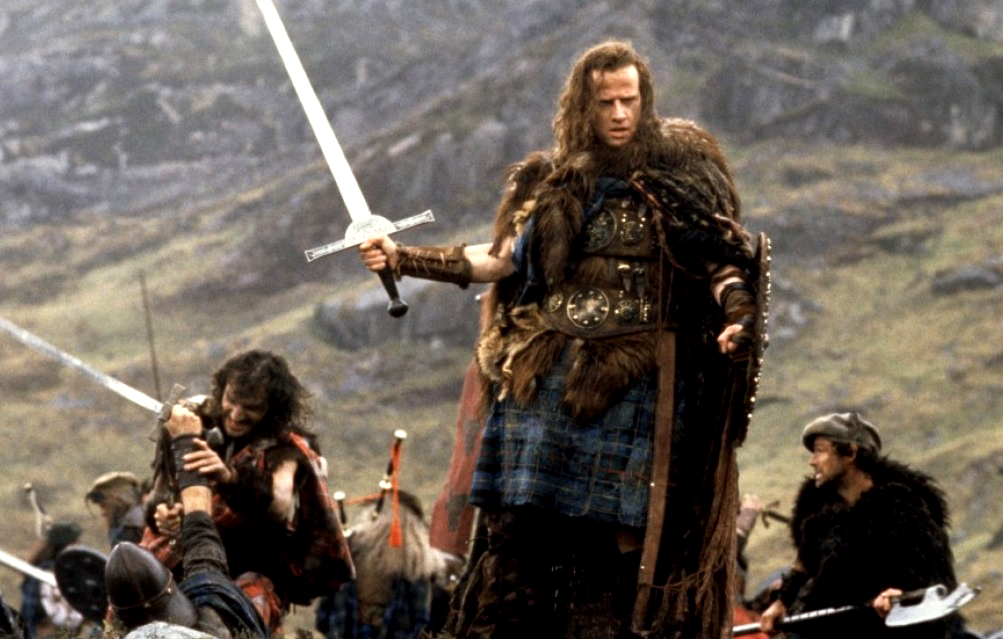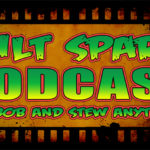
Highlander is a terrible movie made with gusto. It's supremely dumb, but you can't argue that it's lazy. This is a movie where two immortals (one played by Sean Friggin' Connery, natch) have a sword fight inside of a 16th-century stone house that doesn't so much crumble around them as it does explode. The stones flying around the combatants look so fake you can practically feel the Styrofoam, but by this point director Russell Mulcahy has committed to throwing everything he has at the screen, regardless of how cheesy or over-the-top it ends up playing.
The movie is ridiculous, and yet, after tanking in theaters, Highlander ended up catching on as a cult classic once it hit home video, spawning three theatrical sequels, one television sequel and a popular syndicated TV series that ran for six seasons. It's hard to explain exactly why, though if I had to guess I'd point to its brazen earnestness coupled with a zeal for world-building that most small-budget fantasies wouldn't have the balls to attempt.
The script for Highlander (originally by Gregory Widen, with a rewrite by Peter Bellwood and Larry Ferguson) had to read like a 15-year-old sword-and-sorcery fan's fever dream. Christopher Lambert, in the role that made him a cult icon for a while, plays Connor MacLeod, a centuries-old Scottish warrior who's one of a line of immortals apparently scattered around the planet. These immortals can only be killed by being beheaded, and they all feel sort of destined to murder each other until only one remains, at which point he will receive "the gift" — whatever the hell that is. When one immortal kills another, he inherits their power via a "quickening." By 1985, when Connor is living under the name of Russell Nash and working as an antiques dealer in New York City, only a few immortals still remain, and they all come to the city for "the gathering," the final battle which will end with one man standing. Presumably a man. The movie never states that a woman can't be an immortal, but we don't see any.
Anyway, if that all sounds like a bunch of confusing bullshit, don't worry — it comes across as confusing bullshit in the movie too. Some of the immortals, like Connery's Juan Sanchez Villa-Lobos Ramirez, seem very friendly and helpful to each other. You'd think in a Hunger Games-style situation like this, the immortals would all be at least a little wary of each other, but there are actually more friendly ones in this movie than bloodthirsty ones. Instead of everyone against everyone, it really turns into everyone against the Kurgan, a giant asshole played by Clancy Brown who dresses like a punk-rock reject and is apparently the strongest immortal of them all (for … reasons). In a flashback, Ramirez warns Connor that if the Kurgan receives the gift, it will bring upon a dark age for all of humanity. He's really the guy no one wants left standing at the end.
So, okay, I can roll with all of this nonsense. The problem is so many concepts are introduced and then left hanging. An immortal apparently gains more power when he kills another of his kind. But we never see that materialize on screen in any real way. There's a fancy light show after Connor beheads an immortal attacker in a parking garage during the opening sequence, but there doesn't seem to be any definable way in which he grows stronger. I suppose we're to assume that the reason the Kurgan is considered the most powerful immortal is because he's killed the most of his kind, but the film never states that explicitly. And the only reason he appears stronger is because Brown is a big dude who growls a lot.
Funny thing is, even with all this mystical mumbo jumbo present, there's still stuff in this movie that makes even less sense. Take the female lead for example, a police detective named Brenda (Roxanne Hart) … who is also bizarrely an expert in metallurgy and sword-making (?!) … and who, despite this, is forced off the parking-garage-murder case by her police chief even though the best evidence they have to go on is an ancient sword found at the scene. I mean … WHAT THE HELL?! Oh, and she also ends up fucking Connor because … well, because he's lonely and because she's the female lead in a 1980s R-rated fantasy film. They don't have much chemistry, and the script doesn't bother to give them a real relationship.
Speaking of the '80s, this movie just screams that decade, from the Queen-heavy soundtrack to the hero wearing pegged jeans over white, high-top tennis shoes to the wrestling match that opens the film to the rampant homophobia on display during a painfully antiquated police-station bit. All movies eventually become a product of the time they were made it, but this thing is like a time capsule of painful '80s trends. (Except for Queen. "Hammer to Fall" never grows old. NEVER.)
The actors' performances range from cornball to awful. Lambert speaks in one of the weirdest accents in cult cinema history, an odd mixture of his native French, the American English he was learning during the making of this movie and the Scottish lilt his character should have (at least in the flashbacks). You can sense Mulcahy giving him the minimum dialogue necessary to advance the story. Brown, a legit great actor, chews up scenery, spits it out and then chews it up again. At times, it seems like he stepped in from one of George Miller's early Mad Max movies. It would be way too much in any other film. But here? Hey, why the hell not? Connery's performance is short, breezy and good-natured, which means it seems to belong in an entirely different film altogether.
But again, there is at least the sense that Mulcahy knew exactly what kind of movie he was making and didn't shy at all away from Highlander's straight-forward fantasy bombast. He deserves credit for that. There's a theory (to which I subscribe) that Hollywood shouldn't remake good movies; it should remake bad ones that had a good concept or a few good ideas buried within. Within those parameters, Highlander practically demands a big-budget reboot. The whole "there can be only one" hook is a strong one, and it's easy to envision a modern-day Highlander that's populated with a colorful cast of immortals, men and women alike. And while the original's sword-fight choreography is nothing to write home about, imagine what someone like The Raid director Gareth Evans could do with a string of to-the-death duels today. Now that could be a Highlander worth remembering.
The original? Eh, not so much.











